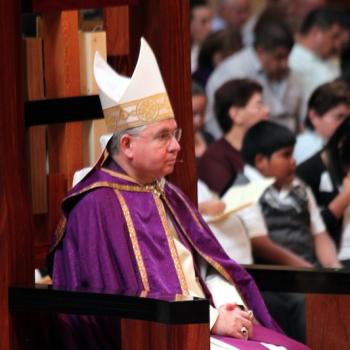I will speak about two specific parts of the Mass today: the Preface and the Holy Holy or Sanctus.
In the early apostolic church, the priest would offer bread and wine and follow it with a prayer of thanksgiving. This spontaneous prayer gave thanks to God primarily for our salvation oftentimes mentioning specific events of salvation history, feasts that were being celebrated or martyrs that were been remembered. This prayer then led into the consecrating of the bread and wine.
As time went on and the Church grew, there was a need to make sure these prayers of thanksgiving did not become too long winded. Some priests were getting too creative and inventive in their theology.
In the early 200s a priest from Rome, Hyppolitus, wrote a document now called The Apostolic Tradition. Hyppolitus considered the way the Church had been praying for decades and suggested how the Eucharist should be celebrated. The first lines of chapter four of his instruction reads,
“Then the deacons shall present the [bread and wine] to [the bishop], and he shall lay his hands upon it, and give thanks, saying: The Lord be with you. And all reply: And with your spirit. The bishop says: Lift up your hearts. The people respond: We have them with the Lord. The bishop says: Let us give thanks to the Lord. The people respond: It is right and just. The bishop then continues: We give thanks to you God, through your beloved son Jesus Christ, whom you sent to us in former times as Savior, Redeemer, and Messenger of your Will… etc etc etc.
This should sound familiar. We still pray this way in the Catholic Church, the same way the earliest Christians did.
This great prayer of thanksgiving which begins with a simple dialogue between the priest and the people is called the Preface. The word Eucharist itself means “thanksgiving” in Greek and some scholars argue that the Christian’s worship began to be called “Eucharist” because of this great prayer of thanksgiving.
Today the priest can choose from over thirty prefaces contained in the Missal.
The preface dialogue we find in Hyppolitus has been translated “it is right and just” in the new translation rather than “it is right to give him thanks and praise.” The easy answer as to why the change, is that the new translation is faithful the Latin, “dignum et iustum est.”
The better answer is that the text from Hyppolitus and the original Latin text speak of justice when we worship God, yet justice is absent in the current response, “it is right to give him thanks and praise.”
Justice is to give each person what is rightfully due to them. This means paying a fair wage to workers, dispensing proper punishment to wrong-doers, giving recognition for a job well done.
We owe worship to God out of justice, in grateful love for all that he is and does. He is the creator of the universe and giver of all good gifts. As a criminal deserves punishment and as a laborer deserves pay, God, out of justice, deserves our worship.
The preface always concludes with words that mention the choirs of angels and saints and the fact that as we gather here on Earth we join in their unending hymn of praise. We sing the Sanctus, Holy, Holy, Holy Lord.
The Sanctus is composed of two Scripture verses: Isaiah 6,3 where Isaiah has a vision of God sitting on his throne surrounded by seraphims praising, “Holy Holy Holy is the Lord of hosts! All the earth is filled with his glory.” The second comes from Matthew 21,9 where the crowds greet Jesus as he enters Jerusalem for the last time, “Blessed is he who comes in the name of the Lord; Hosanna in the highest.”
We praise God with Scriptural acclamations, joining all of creation in one voice. This is why the Sanctus should be sung loudly and powerfully.
Hostsis the translation of the Latin word Sabbaothwhich means armies. The acclamation praises God of the angelic armies. The word hosts has been preferred throughout the centuries in English translations since it sounds less-militaristic. The new translation reflects better the passage from Isaiah which acclaims a God of Armies and not a God of power and might.
We are now only weeks away from the implementation of the new translation of the Roman Missal. The truth is that most of the changes affect the prayers the priest offers. The prayers of the assembly which are said in common only change here and there and thanks to the handy pamphlet and the new tunes we are learning for the ordinary of Mass, we’ll be ready.












